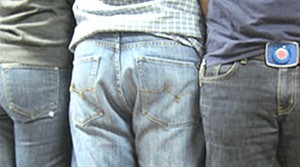 Havana, Cuba. September 27, 2013 . José Antonio does not have family to send him dollars, so he had to work more than a month in a private restaurant to be able to buy a pair of jeans.
Havana, Cuba. September 27, 2013 . José Antonio does not have family to send him dollars, so he had to work more than a month in a private restaurant to be able to buy a pair of jeans.
Taking his wages and tips, he had a little over $40 and went to store offering Fariani, the military-owned state chain Caracol SA, located in the Comodoro Hotel in Havana, to choose some jeans.
He didn’t buy the jeans that he wanted, but the ones that he found there. But he no more than hit the streets in his “new” jeans than the seams split. They were rotten.
José Antonio’s odyssey is common in Cuba. This reporter has suffered the same. He could not recover the money invested, as it is not customary among men to save the receipt. And besides, he was afraid of inviting ridicule by appearing at the store with such plunder.
Caracol, at 1st and 20th in the Miramar neighborhood, stocks its chain of stores with goods from the Panamanian supplier Ariela SA, directed by Miguel Alonso. Fariani is one brand offered.
Basically they offer out-dated clothes, aged and deteriorated, bargain lots acquired by the Cuban military, who for their bad taste are nicknamed “Bananas spots” by their subordinates.
Brands like United Colors of Benetton, Rifle, Paul and Shark, are sold to Cubans at the prices of European boutiques. But be careful ! They are out-dated clothes, having been in the stores for years. Garments that have remained unsold in the international market.
Shirts with enormous lettering, huge pants about to split at any seam. The Adidas brand is, perhaps, an exception because it requires that its foreign buyers to be the same sellers who show their faces to the public.
Cuba is a captive market. Cubans have no other option than to buy in the shops of the generals.
The customs authorities imposed a penalty of $10 for each additional pound of imported clothing. Now the Ministry of Labour just passed a resolution that, from the first day of next month, they will no longer allowed self-employed people who operate little businesses under tailors or dressmakers licenses to sell current and cheap clothing acquired by people traveling outside, who leave without luggage and return loaded like mules.
Shortages in the State markets are nothing new like the authorities want us to believe. Since the coming to power of the current regime in 1959, it’s not even possible to keep using one brand of toilet paper so people usually use the official organ of the Communist Party, the newspaper Granma, as a common replacement.
The absurd Cuban system is loaded with prohibitions — despite certain changes — where some professionals such as veterinarians are forced to open business facades as dog groomers, because they are not allowed a license to practice privately.
By Leonel Alberto P. Belette
From Cubanet
30 September 2013
